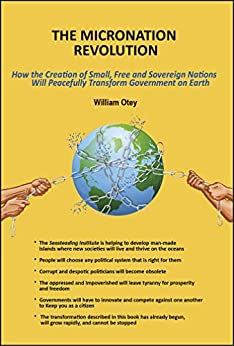
William Otey’s book The Micronation Revolution is a showcase of government injustices and an exploration of possible solutions. Otey takes a strong minarchist position, advocating the privatization of “most” government functions. Further, he envisions this happening via the spread of small, independent communities, called micronations, that will compete for citizens by moving closer and closer to a classical-liberal utopia.
This free-market approach to developing a better government is reminiscent of Panarchy, Zach Weinersmith’s Polystate, and other competition-in-government approaches. Unfortunately, Otey never considers anarcho-capitalism. His libertarian instincts bring him close at times, but ancaps will be amused at his calls for “near-complete political freedom” and recoil at statements like, “of course some government and some laws are obviously necessary and desirable.”
The second biggest problem with the book is that it is in desperate need of an editor. The language is often rough, with both grammatical errors and organizational issues. This makes it difficult to read at times, and occasionally challenging to follow at a high level. (UPDATE: Otey informs us that a new version of the book has been released that fixes many of these problems, so if you put the book down because of them, you may want to consider taking a second look.)
Despite taking on the impossible task of reforming government, Otey does an admirable job attacking the problem. He explains many of the biggest problems caused by the state, and does so with a passion that is appropriate for such enormous evils. The examples are invigorating, from the Alien and Sedition Acts, to the suspension of Habeas Corpus, the income tax, and more modern cases like the Defense Authorization Act.
Otey devotes the latter half of the book to two potential avenues for getting micronations started: seasteading and buying land from existing countries. The section on seasteading leans heavily on content from the Seasteading Institute. In what is probably the most inspiring part of The Micronation Revolution, he tells the story of Sandy Springs, GA, where the city is run almost entirely by private businesses. He then turns towards the question of how to construct a government that won’t be evil.
Disappointingly, his solution is just to repeat the mistakes of the US founding fathers. He calls for a founding document with clear language, transparency, lower taxes, term limits, a citizen congress reminiscent of what 20th century communists envisioned, a citizen judicial review, and a leaner version of modern welfare: “good food, shelter, and medical care are given to anyone truly in need of help and no one else.”
Needless to say, this will all sound lovely to a libertarian who is still hanging on to the hope that good government is possible, but ancaps may be bored by ideas that have already been tried and failed. Why will micronations succeed when every other attempt at limited government has spiraled out of control? Otey does not say. But the answer is obvious: they won’t, unless they reject government entirely and base their societies on strict adherence to the non-aggression principle. That means anarchy.
A liberty-loving jumble of good information and red-herrings, in need of an editor. Two Murrays.


